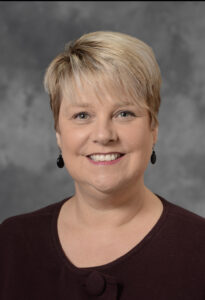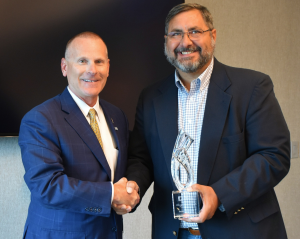
“For every complex problem, there is an answer that is clear, simple and wrong.” – H.L. Mencken
 Nurses are the heart and soul of our healthcare ecosystem. They were heroes long before the COVID-19 pandemic, they stepped up in extraordinary ways during the darkest days of that chapter in our history and they remain heroes today. Anyone who has spent time as a patient – or the family member of a patient – knows how impactful nurses can be, and how they truly become the face of our healthcare experience. In short, they deserve our admiration and support.
Nurses are the heart and soul of our healthcare ecosystem. They were heroes long before the COVID-19 pandemic, they stepped up in extraordinary ways during the darkest days of that chapter in our history and they remain heroes today. Anyone who has spent time as a patient – or the family member of a patient – knows how impactful nurses can be, and how they truly become the face of our healthcare experience. In short, they deserve our admiration and support.
Our Michigan hospitals are proud to employ more than 62,000 nurses and the reality is that we are desperately trying to hire thousands more in every corner of the state. In terms of the supply of nurses, Michigan is confronting the same dynamics as the rest of the country. First, the significant number of baby boomers reaching senior status in recent years has translated to a growing exodus of nurses to normal retirement, while the unprecedented stress of the pandemic and its aftermath led many more to leave the field earlier than planned. As we engage with our leaders throughout the state, there is no question that the day-to-day work of our nurses has never been more challenging, and the rise in self-reported burnout rates is real and palpable.
On the first day of graduate school, one of my professors said something that I have subsequently heard many times throughout my career, and it is unequivocally true: “healthcare is not rocket science…. it’s much more complex than that.” This complexity is not limited to the incredible science behind our medical diagnoses and interventions, but extends to the organization and financing of that care as well. In practical terms, what this means is that absolutely nothing in healthcare happens in a vacuum – every potential lever to be pulled in the operational or public policy realm is impacted by a complex set of interwoven realities.
A case in point: recently-introduced state legislation (Senate Bills 334–336 and House Bills 4550–4552) would create mandatory minimum nurse-to-patient staffing ratios for Michigan hospitals. On the surface, such a mandate would seemingly ensure that we will have more nurses on the hospital floor, simultaneously alleviating their stress and creating better, safer care for patients. I would like to explain why this clear and simple proposal is flat out wrong.
Every single day in every single Michigan hospital, nursing leaders determine appropriate staffing levels in the emergency department, the labor and delivery unit, and in every other corner of the facility. These decisions take into account a complex set of variables, including the volume and acuity level of patients in house at that time, the training level and experience of not only the nurses, but all other members of the care delivery team, the various technologies that may or may not be available for deployment, and a wealth of in-house data and metrics that are updated multiple times per day. Seasoned nurse leaders have developed a good sense of the unique dynamics in a given community and in a given hospital, and they use their long experience to ensure the safest possible staffing models accordingly.
Here is the bottom line: even if there was a robust, immediately available supply of nurses to meet the proposed minimum staffing ratio mandate (there is objectively not), and even if there was an unlimited supply of available funding to pay for this new staffing (there is objectively not), there is simply no way on earth that it makes sense to replace the expert judgment of nurse leaders at the local level with a one-size-fits-all, inflexible model developed by politicians in Lansing.
There is a good reason why the Michigan Organization of Nurse Leaders (MONL) is adamantly opposed to this legislation, and good reason why many nurse leaders I have spoken with in recent months have said they are personally offended by the premise behind it. Such a mandate would create an untenable situation for hospitals when a patient shows up and the facility is already at the mandated ratio: willingly ignore the law and risk penalties, fines and reputational damage, or follow the law and essentially tell the prospective patient “There is no room at the inn” and send them down the road. Of course, the hospital down the road will be in precisely the same boat. Without question, more hospitals will go on diversion, more hospitals will temporarily or permanently take beds offline, and more hospitals will make the difficult decision to eliminate entire service lines. In other words, the real losers here are patients and communities, who will lose access to care. This will be a reality in every corner of the state, and particularly alarming as we consider winters in rural Michigan and the distance between providers. Access reductions will become very serious, very quickly.
In public policy and politics, it is often instructive to examine other states that have already implemented a policy that is under consideration. To that end, California was the first state to adopt legislatively mandated nurse staffing ratios, some two decades ago. According to data from the Bureau of Labor Statistics, Michigan has a greater number of nurses per capita today than California. Despite having staffing ratios, California continues to have a shortage of 40,000 RNs, demonstrating they are suffering from the same problem as all other states in the country and the presence of legislatively mandated staffing ratios has done virtually nothing to improve the size of the workforce. Meanwhile, Michigan outperforms California in hospital quality, as Michigan has both a higher percentage of 4- and 5-star hospitals than California (49% to 35.3%) and a lower percentage of 1- and 2-star hospitals (18.4% to 38.7%), according to CMS Care Compare Hospital Overall Star Ratings.
Legislation similar to what is now being proposed here in Michigan was recently defeated in Minnesota, after the leadership of every single hospital in the state raised grave concerns about the severe negative consequences of its passage. The Mayo Clinic – world-renowned for its quality of care – publicly threatened to withdraw billions of dollars in planned investment in the state should the bill be adopted. The fact that an organization of their reputation and credibility felt so strongly about the negative ramifications of this concept should be a major red flag for policymakers in all states.
The mission of the MHA is to advance the health of individuals and communities. When we see public policy proposals that jeopardize our ability to achieve this mission, no matter how well-intended, we will do everything in our power to stand strong, to stand united and tell our story to our elected officials. Healthcare is complex, and Michiganders deserve better than ham-handed mandates coming from Lansing.
As always, I welcome your thoughts.



